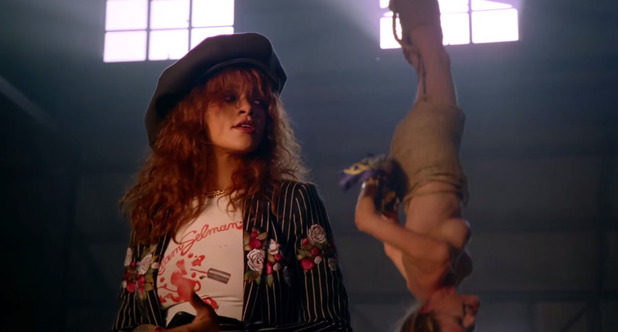Rihanna’s ‘Bitch Better Have My Money’ Clip Is Not An Insult To Feminism; It’s A Step Forward
As with everything Rihanna does, this one's complicated.

Kidnap, torture, small dogs and Hannibal’s Mads Mikkelsen; Rihanna’s directorial debut, ‘Bitch Better Have My Money’, crams it all into a fun and super-violent, Tarantino-esque seven minutes.
The narrative follows Rihanna as she kidnaps a wealthy white woman, in an attempt to retrieve money owed to her by the woman’s husband – Rihanna’s accountant and, it’s suggested, ex-lover. If that seems oddly specific, it’s because it’s probably based on a real-life beef: Rihanna recently sued her former accountant for poor advice, that saw her lose millions of dollars in one year.
Since its release on Thursday, the clip has ignited yet another debate in that famous hit series, But Is It Feminist? The violence contained in BBHMM is, after all, actually pretty intense. The Wife is stripped, suspended upside down, bottled and drugged, and the Husband/Accountant/Bitch is murdered, leaving Rihanna to drape herself casually in a Louis Vitton chest of cash covered in his blood.
is rihanna's new music video feminist??? is rihanna's tattoo feminist??? is rihanna's weave feminist??? is rihanna's left titty feminist????
— Hannah Giorgis (@ethiopienne) July 2, 2015
If we lived in a society that didn’t have epidemic levels of violence against women (a woman in Australia is murdered every week), perhaps this clip wouldn’t have sparked such a debate. Gratuitous and sexualised depictions of women kidnapped and tortured hits a little too close to home when it is an unfortunate reality of our daily lives, and audiences are getting sick of women’s suffering being used as edgy entertainment. But the question of feminism (or lack thereof) is even more complicated this time: in ‘BBHMM’, it rests on the conundrum of violence against women when it’s perpetrated by women.
There are two main camps of this debate: On the one hand, there are those like Refinery29’s Erin Donnelly who argue that Rihanna perpetuates violence against women by depicting female misogyny; on the other, there are those who maintain Rihanna should be allowed to do all the kickass stuff in her music videos that men get to do without question. With ‘Bitch Better Have My Money’, Rihanna has made the kind of dark, violent and fun clip — kidnapping; bare breasts; violence; murder; cash — that would traditionally have a male as its protagonist. Rihanna has flipped the script.
Incidentally, Taylor Swift’s recent video for ‘Bad Blood’ – stuffed full of female celebs fighting each other in action movie gear – drew similar analyses: some argued that violence can never be feminist, while others claimed the video as a victory for female representation in the action genre.
One of the benefits of being a male musician about to release a music video is that no-one will ask you if it is feminist. #Rihanna
— Musa Okwonga (@Okwonga) July 3, 2015
The one part of ‘BBHMM’ that everyone seems agreed upon is the discomfort we feel about the sexual humiliation suffered by the female victim. She is stripped and suspended upside down, the gaze set on her exposed breasts. Rihanna might kill a man in this video, but it’s the woman who suffers in the most exploitative way – a reality unfortunately shared by many male-led narratives of this genre.

But Rihanna’s work has always been complex, and often confronting. The clip for 2013’s ‘Pour it Up’ got a lot of negative press for how it depicted female strippers, but its critics once again seemed to miss the inherent power in a black woman unapologetically talking about making money as she sexually expressed herself. Just as ‘Pour it Up’ evoked the aesthetics of a strip club fantasy, it also featured a deliberate absence of any men – posing the question, whose gaze is this? It’s this boldness and complexity that makes Rihanna such a fascinating musician.
In that light, her casting of Mikkelsen as the accountant in ‘BBHMM’ becomes more than just a ploy for views; it becomes a statement. A Danish actor best known for playing Hannibal Lector in NBC’s recently cancelled Hannibal, Mikkelsen is usually the one in control. Week after week in Hannibal he’s seen tying up people and brutally killing them – all in a highly stylised way, much like ‘BBHMM’. As a wealthy white man, his character’s degradation as “the bitch” and his murder by a Rihanna – a black woman – is a strong symbol, that sits within an extremely progressive type of revenge fantasy. You can look at the violence inflicted upon the Wife in a similar way: Race is as important as gender in ‘BBHMM’ and, as Mia McKenzie of Black Girl Dangerous points out, Rihanna’s prioritising of her own wellbeing over a white woman’s is a radical statement.
As the debate about ‘BBHMM’’s feminist credentials rolls on, I for one hope to see more badassery to follow – Rihanna disrupts the narrow parameters of mainstream feminism, and emerges a true boundary-pusher in the world of pop.
–
Jessica Alice is the co-director of the National Young Writers’ Festival and poetry editor of Scum. She tweets @jessica_alice_.

